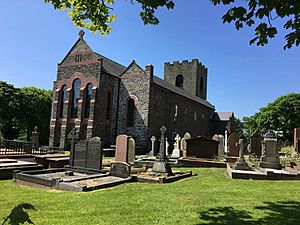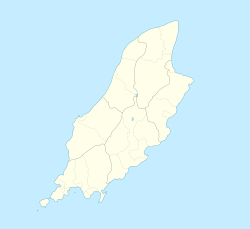St George's Church, Isle of Man facts for kids
Quick facts for kids St George's Church |
|
|---|---|

St George's Church, Douglas, Isle of Man
|
|
| 54°08′58″N 4°29′01″W / 54.149384°N 4.483710°W | |
| Location | Upper Church Street, Douglas, Isle of Man. |
| Country | Isle of Man |
| Denomination | Church of England |
| Tradition | Conservative evangelical |
| History | |
| Status | Parish church |
| Founded | 1761 |
| Dedication | Saint George |
| Consecrated | 29 September 1781 |
| Architecture | |
| Functional status | Active |
| Style | Gothic Revival |
| Groundbreaking | 1761 |
| Completed | 1781 |
| Construction cost | Approximately £1,500 |
| Specifications | |
| Capacity | 1,300 |
| Administration | |
| Parish | St George and All Saints |
| Diocese | Diocese of Sodor and Man |
St George's Church is an Anglican church located in Douglas, Isle of Man. It is part of the Diocese of Sodor and Man, which covers the Isle of Man. This church used to be one of two main places of worship, along with All Saints Church, Douglas.
Contents
History of St George's Church
In the early 1700s, Douglas was a small town with about 800 people. The first St Matthew's Church was the main place for people to worship. However, the town grew a lot because of the smuggling trade, also known as the Running Trade, which brought more money to the island.
By the mid-1700s, Douglas had over 3,000 people. The old St Matthew's Church was too small for everyone. So, people decided that a new, bigger church was needed.
Building the Church
Starting the Construction
A good spot was found on a hill outside the town, with a view of Douglas Harbour. This area was then part of the Parish of Braddan. Wealthy people from the town, some of whom had made money from the running trade, helped pay for the church. They collected money from the public. By 1761, they had raised £712. But after four years, the money ran out, and work on the church stopped.
Finishing and Opening the Church
Nothing happened with the church building until 1776. More money was raised, an extra £800, and construction started again. The church was finally finished and officially opened, or consecrated, on September 29, 1781. To pay off the remaining costs, people had to pay to get a special seat, called a pew. A first-class pew cost 25 guineas, and a second-class pew cost 15 guineas. A guinea was an old British gold coin.
The completed church was very large and could hold 1,300 people. Many generous people donated beautiful items for the church. For example, John Murray, 4th Duke of Atholl, gave a silver set for Holy Communion, made by a silversmith in London. Later, Henry Bloom Noble paid for a beautiful stained glass window.
Many important local people were buried in the churchyard. These include Sir William Hillary and Nelly Brennan. There is also an open grassy area in the churchyard with a single cross. This area is a mass burial site for people who died during the cholera outbreaks in 1832 and 1833.
Church Organ
St George's Church was the first church on the Isle of Man to have an organ. This organ was built in 1741 by Harris & Byfield. One of the church's trustees bought it from the Dublin Assembly Hall in 1778 for £100.
This is a very special organ because George Frideric Handel used it to conduct the first performance of his famous music piece, the Messiah. This performance took place in Dublin in 1742.
One of the first people to play this organ was Charles Barrow, who was the grandfather of the famous writer Charles Dickens. The organ was repaired and updated in 1950 by Jardine's of Manchester. This repair cost £3,985.
Important Gravesites
- Sir William Hillary: He was a kind person who started the Royal National Lifeboat Institution, which saves lives at sea.
- Nelly Brennan: She was known as a hero during the cholera outbreaks.
Gallery
See also
- Diocese of Sodor and Man
- Bishop of Sodor and Man
 | Emma Amos |
 | Edward Mitchell Bannister |
 | Larry D. Alexander |
 | Ernie Barnes |





